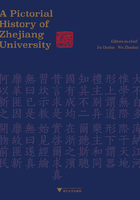
4 Chu Kochen as President

Chu Kochen (1890-1974)
Courtesy name Oufang, Chu was an academician of Chinese Academy of Sciences, a meteorologist and educator. He went to study in the US in his early years and came back to China with a Harvard PhD years later. After his return, Chu was successively Chairman of Department of Geology and Geography in National Southeast University, Director of Meteorological Institute under Academia Sinica, President of Science Society of China. In April 1936, Chu was appointed President of National Zhejiang University. After the founding of the People's Republic of China, Chu worked as Vice President of Chinese Academy of Sciences, etc.
On December 9, 1935, students from universities, high schools and middle schools in Beijing staged a demonstration against Japanese aggression and imperialists, for safeguarding national territorial integrity and saving China, which initiated another round of such patriotic demonstrations across the nation. Under the leadership of Chairman Shi Eryi and Vice Chairman Yang Guohua of the Student Union, students from Zhejiang University, together with over 10,000 students from middle schools and other universities, supported the students in Beijing against the self-government of North China, which, however, was obstructed and sabotaged by President Guo Renyuan of Zhejiang University. It triggered the rages of students and teachers. A petition over the dismissal of President Guo signed and sealed by students was issued, starting a 4-month-long “Out with Guo Campaign”. The Campaign forced the Chinese National Government to dismiss Guo Renyuan. With the recommendation of scholars and celebrities, the Government decided to appoint Chu Kochen as President of National Zhejiang University.
After he became President of ZJU, Chu took great efforts to reform the governance of the university and invited excellent professors from various fields to be part of strong faculty; based on the concept of “professors as the soul of a university”, Chu advocated and implemented the idea that professors govern the university; he enhanced democratic management and respected the freedom of thinking; he emphasized all-round education and encouraged research. After the outbreak of the Chinese People's War of Resistance Against Japanese Aggression, Chu led the students and teachers, as well as some of their relatives to embark on the great westward migration. Along the way, they took huge batches of books and instruments and persevered in teaching and learning even in exile. In that difficult period, “Seeking Truth” was ascertained as the university motto. Guided by the motto, Zhejiang University developed very fast and rose to be one of the most famous universities in China. Joseph Needham, a famous UK scholar, esteemed it “Oriental Cambridge”.
Chu Kochen contributed a lot to meteorology, geography and natural resources investigation, science popularization,research and management,etc.Chu's masterpiece—A Preliminary Study on the Climate Changes since the Last 5,000 years in China—was the fruit of his life-long painstaking research, which amazed the world.
Chu devoted his whole life to education and research and achieved great success. He deserved the title of “a banner of modern scientists and educators, and the grandmaster of geography and meteorology”.